 The bonfire-orange leaves do not miss the days they were green.
The bonfire-orange leaves do not miss the days they were green.
The canyon-throated bullfrog does not wax nostalgic for his polywog past.
The muppet-headed Siamese does not lament the loss of her earlier lives.
They are all a good deal wiser than we are.
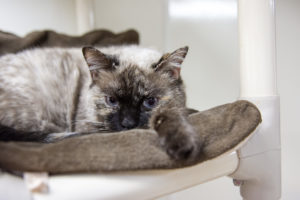 The older I get, the more I’m convinced that somewhere in the ballpark of 88% of our problems come from trying to fend off loss. Like frantic fencers with blinders strapped across our eyes, we jab at the future, petrified it’s going to come and take our stuff.
The older I get, the more I’m convinced that somewhere in the ballpark of 88% of our problems come from trying to fend off loss. Like frantic fencers with blinders strapped across our eyes, we jab at the future, petrified it’s going to come and take our stuff.
Which it might.
Which might not be a catastrophe.
Cats, being in league with leaves and bullfrogs and saints and angels, do not contemplate change. That frees them from the false equation scrawled across our inner chalkboards, “change = loss.”
Change certainly looked like loss for Zelda. Like the chunky grey Legend of Zelda cartridge from your original Nintendo Entertainment System; like the last rose of summer; like the roadmap you’d written in permanent ink for the next five years; Zelda’s original adoptive home vanished, morphed, changed into something else.
What was meant to be a permanent address turned into a way station. What was meant to be the green, green grass of home turned into a frenzy of falling leaves. What was meant to be Happily Ever After turned into To Be Continued.
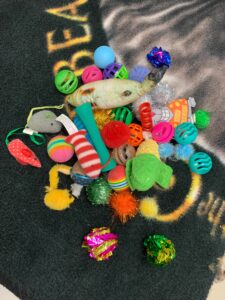
When Zelda came back to Tabby’s Place — “once a Tabby’s Place cat, always a Tabby’s Place cat” — you might say that things got worse. You might, but Zelda wouldn’t.
At any rate, the changes kept coming. She bounced from one suite to another. Old faces were absent; new faces were obnoxious. She was trundled to our Timeshare suite, the private penthouse where Cats Of A Certain Crankiness are encouraged to think deep thoughts and/or unlearn the ways of war. (Quoth Zelda: “Pete Seeger was a polywog. I am, in fact, gonna study war, much more.”)
Routine was no more reliable than poutine, but Zelda was only interested in the latter. (Sadly, it was not delivered, not even once, although we did try to make it up to her with way too many toys. Behold our zealotry at left.)
Change was constant.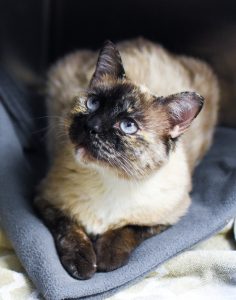
But loss was in the eye of the beholder. And Zelda’s true, blue eyes beheld nothing but opportunity.
Opportunity to expand.
Opportunity to acquire (tasty polywogs, tasty memories, tasty friendships).
Opportunity to move up in the world, indeed the ultimate uptown of Tabby’s Place, the Executive Offices of Jonathan and Honey, And Yes I Will Pay Dearly For Having Listed Him First.
Opportunity to try on new colors and sentiments: “Perhaps I will snuggle the hairless ones today. Perhaps I will attempt mindfulness meditation. Perhaps I will write a sonnet about how paper-thin provolone does not feel a sense of loss over giving its life for grilled cheese. Perhaps I will bite 30% fewer human calves.”
Perhaps we can be a smidge more Zeldish in our own approach to change.
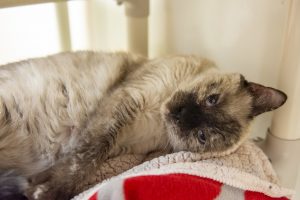 We cling to our routines like ramparts, agonizing over autumns and unmade plans. Staring down the barrel of the new, all we can see is what we’ll have to give up. But this is no way to live, and certainly no way to be a legend.
We cling to our routines like ramparts, agonizing over autumns and unmade plans. Staring down the barrel of the new, all we can see is what we’ll have to give up. But this is no way to live, and certainly no way to be a legend.
We may have to move.
We may have to say ghastly goodbyes.
We may have to get used to the greatness and the great hollering overwhelm of a new expansion or a new relative or a new paradigm. (Quinn’s Corner has brought all of the above: a physical and metaphysical expansion, obviously; galleons of future new relatives in the form of fey felines; and more paradigm shifts than you can fit into a fifty-acre parallelogram. That’s a lot.)
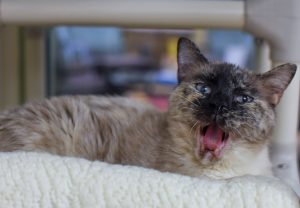 We may have to learn new skills and secrets and shorelines, as our old maps fall into the pond and glug-glug-glug below the algae.
We may have to learn new skills and secrets and shorelines, as our old maps fall into the pond and glug-glug-glug below the algae.
But we may not have to consider it catastrophic. That much is our call.
At the far end of Zelda’s inglorious return to Tabby’s Place was a glorious goulash of grace and love.
If she’d never careened through change, she’d never have known the pleasure of being addressed as She Most Exalted. (I can neither confirm nor deny that 100% of the staff and 88% of the cats have learned it is in our best interest to make frequent use of this honorific.)
If she’d never been squeezed like Play-Doh through an unexpected change of address, she’d never have known the warmth and the fire-fierceness of a Tabby’s Place “welcome home.”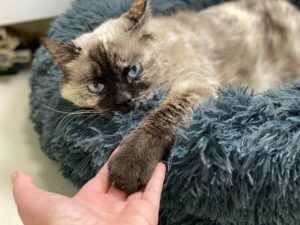
If she’d never surrendered to “catastrophe,” never risked sitting out on the hill under a starless night, she’d have slept straight through the sunrise, the great surprise, the eucatastrophe on the starry end of every change.
Right up there with argle-bargle and bumbershoot, “eucatastrophe” is one of those woefully underused terms that could change our world, if we’d let it. But even if you don’t know the word, you know a good eucatastrophe when you see it: it’s the happy ending, the reversal of sorrow, the great undoing of despair.
And it always, always, always comes.
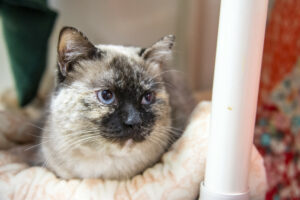 Trouble is, we’re so tethered to our fears of loss that we’re prone to jab it.
Trouble is, we’re so tethered to our fears of loss that we’re prone to jab it.
Eucatastrophe — Zelda’s new chapter; your unexpected happiness in your weird new town; the sturdy tenderness that comes after sharing a siege of sorrow — is an elfin friend, small but magical, always on your side but too respectful to roost on the bridge of your nose.
You can only see it if you hear the frog-song, sit at the knee of the stars and seasons, and write it on your heart that change is not loss, and every good legend includes leaf-piles of change.
We’d do well to leap right in.
